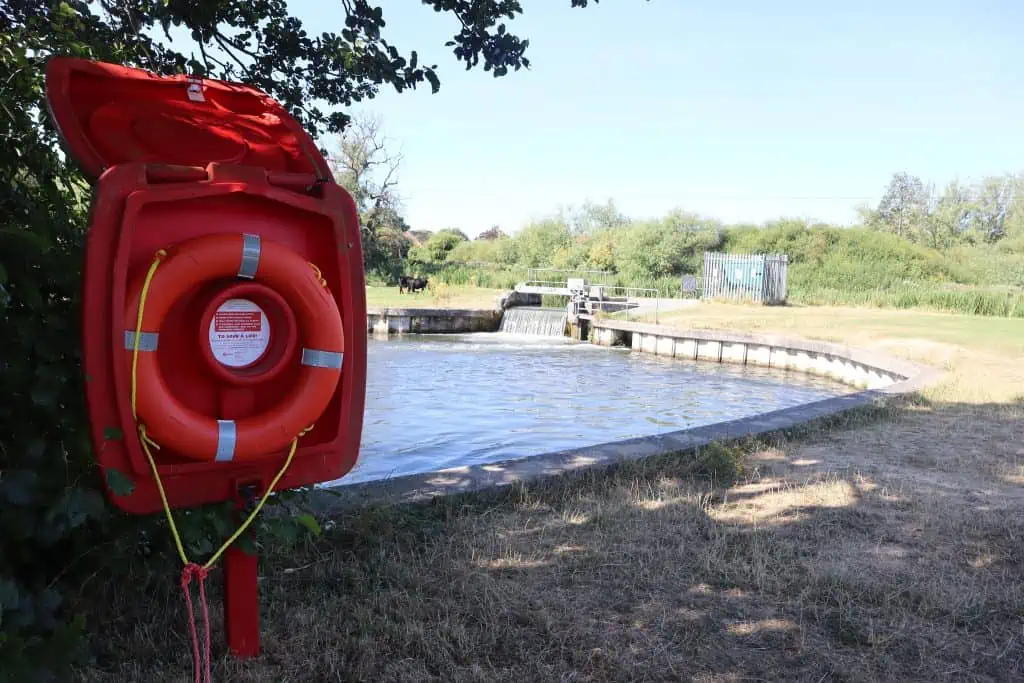With the summer holidays just around the corner, Royal Berkshire Fire and Rescue Service (RBFRS) is taking the opportunity to remind people to stay safe by respecting the water.
This week is Drowning Prevention Week, a campaign run by the Royal Life Saving Society, which aims to equip young people with the knowledge they need to enjoy the water safely. Almost 250 people accidentally drown in the UK every year, with men over the age of 15 accounting for 83 percent of accidental drownings according to a report published by the National Water Safety Forum.
Whilst open water might look inviting in the summer, hidden currents and cold water shock, caused by the sudden change of temperature between the air and water, can catch even the best swimmers off guard.

Heavy rain over the winter has brought extra dangers into Berkshire’s waterways. Debris, especially large branches and litter, pulled into rivers by flooding earlier in the year may still be lurking below the water, posing a risk to anyone unfortunate enough to get tangled in them.
David Grayson, Group Manager at RBFRS, said: “With so many rivers, lakes and canals running through Berkshire, it’s important that people know how to stay safe when spending time in and around the water.
“Our teams are working closely with our partners to make Berkshire’s waterways safer. Our crews and prevention staff regularly give talks to school groups on water safety, we’ve supported the installation of lifesaving equipment throughout the county and we’ve expanded our water rescue capabilities to help keep people safe.
“However, we know that young people who are finishing school or college for the summer may be especially tempted to enter the water to cool off. What we would remind them, and their parents, is that they must respect the water.
“Please don’t jump into rivers from bridges, don’t drink alcohol before swimming and never swim alone. If you want to go swimming, make sure that there is a lifeguard present or join an organised open water swimming group.”
If you see someone in difficulty in the water, remember ‘Call, Tell and Throw – Call 999, tell the person to float on their back and throw something to them to help them float.
“Our teams are working closely with our partners to make Berkshire’s waterways safer. Our crews and prevention staff regularly give talks to school groups on water safety, we’ve supported the installation of lifesaving equipment throughout the county and we’ve expanded our water rescue capabilities to help keep people safe.”
David Grayson, Group Manager at RBFRS
Russell Robson, Team Leader for the Environment Agency, said: “As the weather warms up, we see more young people taking unnecessary risks around our locks, weirs and sluices. These are dangerous structures with strong currents that can drag you under or sweep you away.
“We urge everyone to avoid climbing, swimming, paddleboarding, kayaking, jumping or diving around these sites. Follow safety signage, and please ensure you know how to ‘float to live’ if you get into trouble”.

To stay safe while spending time in and around Berkshire’s waterways:
- Do not jump from height into water, often referred to as ‘tombstoning,’ as this can cause cold water shock.
- Avoid swimming in open water such as rivers, lakes, canals or quarries. You have no idea what is beneath the surface and unseen currents or reeds could pull you under.
- If you do wish to take part in open water swimming, know the difference between designated and non-designated bathing waters and do so as part of a group. Do not swim alone.
- At the beach, choose a lifeguarded beach and swim between the red and yellow flags.
- If you find yourself in trouble in the water, float to live. Do not panic, float on your back until the effects of cold water shock pass. When the cold water shock has passed, you can then swim to the edge or call for help.
- Take care when walking or running along riverbanks as you may slip, or the floor might give way underneath you. Accidental drownings often involve people who never intended to enter the water.
- If you are under the influence of alcohol, make sure you and take care to avoid walking near water on your way home. ‘Be a mate’ by suggesting an alternate route and checking in on your friends to make ensure they are safe.
- If someone else falls into the water, call 999 straight away and ask to speak to the Fire and Rescue Service if inland and the Coastguard if at the Coast.
For more information on how to stay safe in the water, visit the water safety pages on our website.
